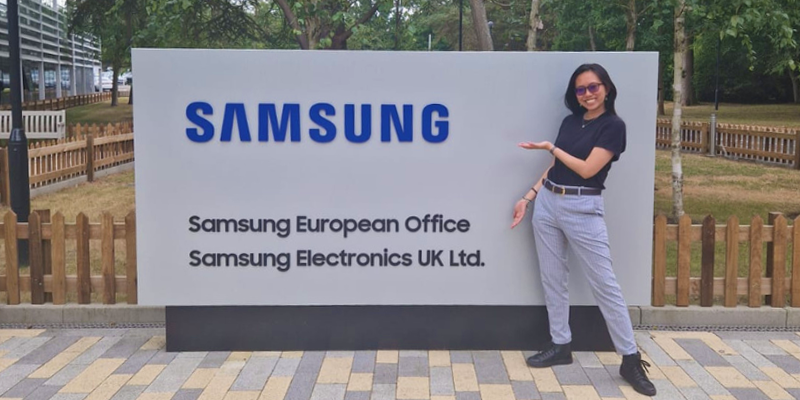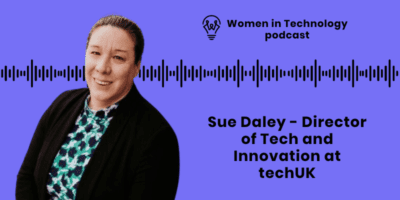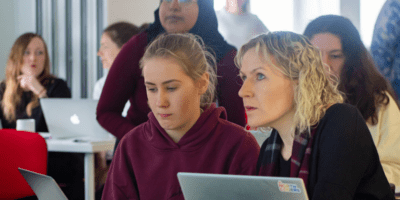Phoebe Ng is a smartphone product management placement student at Samsung, who is currently on a placement before returning to the final year of her economics degree at the University of Essex. She came to study in the UK from Malaysia and is an ambassador for Bright Network, an organisation that connects graduate talent with opportunities. Phoebe is also a champion for mental health support.

“Perfection is just you being you. It’s not you trying to be someone else or be some idealised person.”
A proud first-generation immigrant
I am originally from Malaysia, so I moved all the way here to the UK for university. Before I started my placement at Samsung, I was an economics student at the University of Essex.
The placement is my first job to date. Before this, I was working as a hotline assistant and also as a student ambassador for my university. When I was applying for jobs, I listed out my experience and I feel like being an international student has really helped me develop my transferrable skills — I didn’t know a single person when I came to the UK and I’ve got myself established, as well as developing my own networks.
Within Samsung, I’m working as a smartphone product management placement student, sitting within the Smartphone Team. Day-to-day my job involves analysing the current markets, and seeing what our competitors are doing. I also prepare presentations, which are used for meetings that can involve as many as 300 people. I also perform numerous other tasks, such as creating trackers or reports that help not only my team but also the wider business as a whole.
I would like to think of myself as the backbone of the team because I get involved in every single bit that makes up the whole team’s task, and any ad hoc requests usually come through me first.
LinkedIn versus reality
Before I secured this role, throughout my second year I’d applied to around 40 companies for placement opportunities and they rejected me. I took a break from LinkedIn for two months without saying anything to anyone because it was getting a little bit too toxic, seeing everybody say: “Oh, I got this”; “I got a new job”; “I got a new placement”. It was a bit much for me at the time.
When I came back two months later, I felt like I had a different mindset about it — if everybody else was ‘winning’ at life, that didn’t mean I wasn’t winning as well. I think the rest period I took really helped me to see things differently, more clearly. Then I got my ‘yes’ from Samsung.
After applying for roles throughout my second year, and almost giving up by the end, Samsung decided to give me a chance. I was up against 6,700 other applicants and they chose me, which meant so much after so much rejection.
I started writing a post about LinkedIn not always reflecting reality because I saw somebody else writing about their own experience and I thought: “Hmm, that’s interesting.” Obviously, I agreed with it. LinkedIn is not always what it seems, you know? It’s an established theme for graduates to write something about LinkedIn versus reality — what’s your reality versus what you post on LinkedIn?
I also wrote about my mental struggles, my fear of failure, that kind of thing. I wrote about how on LinkedIn it can feel like nobody gives you that benefit of the doubt, and that all your achievements can seem overlooked or forgotten. I feel like LinkedIn doesn’t always have enough of that kind of generosity of spirit.
LinkedIn is seen as a professional social media channel, but I remember seeing posts where somebody would open their heart about something that happened in their personal life, but then I’d see someone in the comments saying: “This is not Facebook.” One of my rules in life is that if you don’t have anything nice to say, just don’t say anything at all.
I feel that if somebody wants to be genuine, wants to be sincere showing the professional community that it’s okay to open up, then I think you should let them, instead of being dismissive.
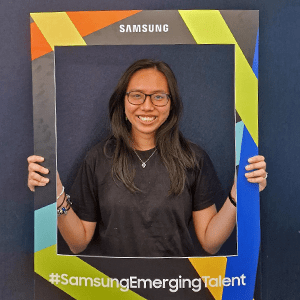
Advice to anybody feeling the pressure to appear perfect
My advice to others who are struggling is that: Perfection is a social construct. Nobody really knows what perfection is. Nobody really knows what the actual end goal of being perfect looks like. Perfection is just you being you. It’s not you trying to be someone else or be some idealised person. Wanting to be perfect is just your fear of failure, but that fear of failure comes from you being human.
I know like a lot of people have imposter syndrome but, especially in the workplace in the 21st century, you should be able to show yourself comfortably. It’s okay if nobody likes you, because as long as you like yourself then that’s the most important thing.
I’ve already been in this company for seven months and sometimes imposter syndrome does creep in, but sometimes when I speak out and share my ideas and my manager says: “Oh, that’s really good”, then you realise that imposter syndrome is just about a fear of being yourself and speaking out about what you think is right.
You have to start conversations, to talk about things that are uncomfortable and be inclusive as well. In my opinion, sometimes you see men in more senior positions and then you would think that you have to be like them, you have to be ‘strong’, you have to be whatever. But in reality, you are already ‘strong’. You’re already a strong, independent woman, even if nobody has already told you that you are.
I experienced imposter syndrome as a first-generation Asian woman immigrant coming into this country without anybody by my side — I didn’t have any connections but I was passionate about my work. To change the narrative of how toxicity starts, somebody just has to speak up, and some kind of change will happen.
What I especially like here at Samsung is that they always encourage us to speak up as placement students. They always say: “Your ideas are important” because their biggest base is people like us, Gen Zs, and Alphas, so they genuinely want to listen.
That’s why it’s good to have a supportive employer, giving you that voice for you to speak up. For me being on a placement, I was definitely out of my comfort zone. I didn’t know anything about tech before I joined. I just thought: “Samsung is a big brand, so let’s go!” That’s literally all I thought about at the time.
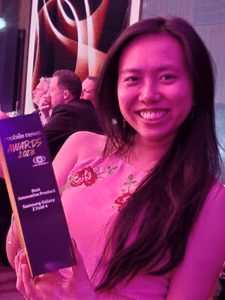
Coming up next
Currently, I’m looking forward to my big break from work because I’m finally seeing my parents after a year. I’m looking forward to ending my placement year with a big bang, with bigger projects, and getting to leave the company saying: “I did this, I achieved that” and getting involved with every possible opportunity I can at Samsung before going back to uni.
When I go back to uni, I hope I can take away all the skills and connections I made. This is just the start of my career. It’s been incredibly useful because sometimes I will look back into my journal and think: “Oh, I didn’t even remember I did that. That was pretty cool”.
I’m proud to be a minority immigrant coming to the UK to work in tech. My parent didn’t go to uni. I was the first member of my family who had the opportunity so I’m happy to be able to share this inclusivity with your Womanthology community.
*The opinions in the article are Phoebe’s own and do not represent the views of her employer.

